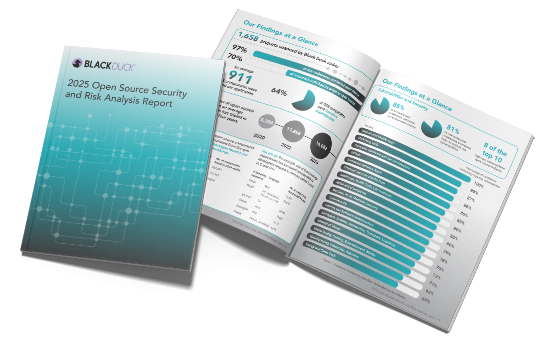Definition
Software composition analysis (SCA) is an automated process that identifies the open source software in a codebase. This analysis is performed to evaluate security, license compliance, and code quality.
Companies need to be aware of open source license limitations and obligations. Tracking these obligations manually became too arduous of a task—and it often overlooked code and its accompanying vulnerabilities. An automated solution, SCA, was developed, and from this initial use case, it expanded to analyze code security and quality.
In a modern DevOps or DevSecOps environment, SCA has galvanized the “shift left” paradigm. Earlier and continuous SCA testing has enabled developers and security teams to drive productivity without compromising security and quality.
What's in your code?
Explore insights into the current state of open source security and get recommendations for securing your open source supply chain
Download the report
How does software composition analysis work?
SCA tools inspect package managers, manifest files, source code, binary files, container images, and more. The identified open source is compiled into a Bill of Materials (BOM), which is then compared against a variety of databases, including the National Vulnerability Database (NVD).
These databases hold information regarding known and common vulnerabilities. The NVD is a U.S. government repository of vulnerabilities. Black Duck has its own internal vulnerability database, Black Duck® KnowledgeBase—the industry’s most comprehensive database of open source project, license, and security information.
SCA tools can also compare BOMs against other (usually commercial) databases to discover licenses associated with the code and analyze overall code quality (version control, history of contributions, and so on). By comparing the BOM against a database, security teams are able to identify critical security and legal vulnerabilities and act quickly to fix them.
Why is software composition analysis important?
SCA’s value is the security, speed, and reliability it offers. Manual tracking of open source code is no longer sufficient; it simply can’t keep up with the sheer amount of open source. And the increasing prevalence of cloud-native applications and more-complex applications make robust and dependable SCA tools a necessity.
As development speeds skyrocket due to the adoption of DevOps methodologies, organizations need security solutions that can maintain development velocity. Automated SCA tools do just that.
Looking for an integrated, cloud-based AST solution? Check out Polaris.
Black Duck Polaris® Platform brings together the market-leading SCA, SAST, and DAST engines that power Black Duck® SCA, Coverity® Static Analysis, and Continuous Dynamic™ into an easy-to-use, cost-effective, and highly scalable SaaS solution, optimized for the needs of modern DevSecOps.
What are the benefits of software composition analysis?
SCA’s value is the security, speed, and reliability it offers. Manual tracking of open source code is no longer sufficient; it simply can’t keep up with the sheer amount of open source. And the increasing prevalence of cloud-native applications and more-complex applications make robust and dependable SCA tools a necessity.
As development speeds skyrocket due to the adoption of DevOps methodologies, organizations need security solutions that can maintain development velocity. Automated SCA tools do just that.
Software composition analysis solutions
Black Duck® SCA is is a comprehensive solution for managing the security, license compliance, and code quality risks that arise from the use of open source in applications and containers. As a recognized leader in SCA by Forrester, Black Duck offers unmatched visibility into third-party dependencies, enabling you to manage software supply chain risks.
Key capabilities include:
- Multifactor scanning: With dependency, binary, and snippet and signature scanning, Black Duck offers the only multipronged scanning approach on the market, able to identify open source that singular dependency offerings from competitors fail to identify. This includes dependencies found in source code, container images, binaries, firmware, and AI-generated code.
- Black Duck KnowledgeBase: Black Duck’s proprietary KnowledgeBase is the industry’s most comprehensive repository of open source, license, and security information, reaching well beyond the standard information found in free feeds like the NVD. Curated by Black Duck Cybersecurity Research Center (CyRC) experts, Black Duck KnowledgeBase covers more than 2,650 unique open source licenses, 132,000 unique vulnerabilities, and over 3.9 million open source projects.
- Black Duck Security Advisories: These advisories offer curated and prioritized security notifications up to three weeks earlier than the NVD. With thousands of exclusive vulnerabilities not listed in the NVD, Black Duck offers the most comprehensive snapshot of your security posture. Curated by CyRC experts, Black Duck Security Advisories are your trusted source for security information. With timely detailed descriptions, severity scoring, and advanced remediation guidance, they're not just accurate, they're actionable. And with custom prioritization, Black Duck Security Advisories offer the greatest depth partnered with the greatest personalization capabilities.
- License identification: Black Duck tracks over 2,650 open source licenses, helping you avoid license violations that can result in costly litigation or compromise your valuable intellectual property.
- Policy settings: Black Duck offers the most customizable and fine-grained policy configuration on the market, allowing you to streamline your security activities.
- Frictionless integrations: Black Duck seamlessly integrates into your existing SDLC and CI/CD toolchains, minimizing friction and helping maintain development velocity.
- Software Bills of Materials (SBOMs): Simplify SBOM management by importing third-party SBOMs into Black Duck to automatically map dependencies to known components and create new components for custom or commercial dependencies. Export SBOMs in SPDX or CycloneDX formats to meet specific requirements.
- Use cases: Black Duck isn’t just useful for security teams; DevOps engineers, developers, and legal teams can all use the valuable data and information it provides to reinforce security, code quality, and legal risk postures throughout the organization.
- This glossary was verified by Mike McGuire.
Related content


Five Considerations for Securing Your Software Supply Chain
Download the supply chain security solution guide

Forrester Wave: Software Composition Analysis
See why Black Duck is a software composition analysis Leader
